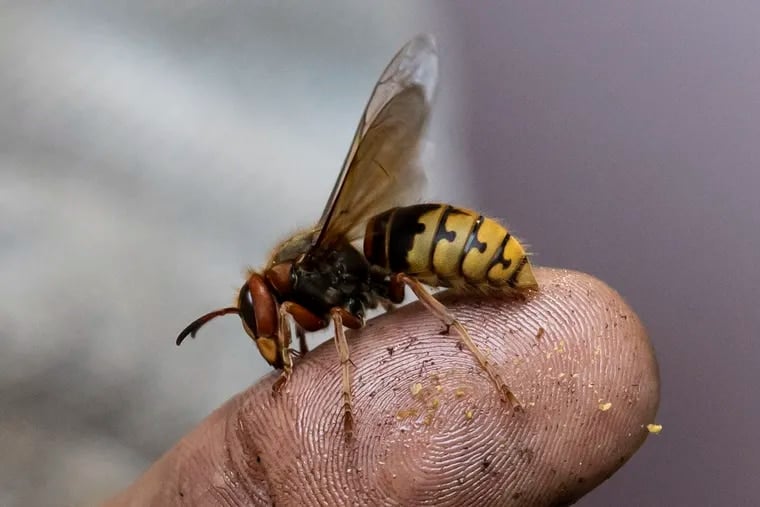- cross-posted to:
- andfinally
- offbeat@lemmy.ca
- cross-posted to:
- andfinally
- offbeat@lemmy.ca
Don Shump, owner of Philadelphia Bee Co., stared at the empty bed of his pickup truck last Friday morning: His portable shop vac, an essential appliance for any bee removal specialist, had gone missing. But then, Shump, 46, of Frankford, remembered what had been inside the vacuum: hundreds of large hornets, giant queens, and yellowjackets he had left swarming in the machine overnight.
A thief had unsuspectingly stolen a hornet’s nest.
And not just any hornets, but European hornets, the only true hornet species in North America. These buzzing bugs, identifiable by their burnt orange wings and bodies as big as wine cork, are the largest social stinging insects in the eastern United States. Cranky creatures and stubbornly defensive of their colonies, European hornets are known to sting repeatedly, and without warning.
There were probably four hundred of them, Shump figured, including a hundred feisty queens, and a thousand yellowjackets, to boot. All part of a removal he had performed the day before, now trapped in the purloined vacuum. Desperate. Furious. Ready to swarm.
“Well, this is going to be extremely unpleasant for somebody,” Shump thought.
Shump, who maintains a collection of educational beehives on the roof of the Parkway Central Library and provides honey to such businesses as Shane Confectionery and Franklin Fountain in Old City, has searched his neighborhood for the vacuum since the Sept. 22 theft. He hoped to find it abandoned, the hornets and bees still inside. He checked for nearby security footage, but found nothing. He didn’t bother notifying the police. ”Not over a $100 vacuum,” he said.
He posted an open letter to the bee bandit on Facebook:
“To the poor soul who lifted the shop-vac out of the back of my truck, I wanted to give you a heads up,” he wrote, warning that the queen bees “should be full of life and extra spicy.”
“I anxiously await your unboxing video,” he wrote.
Smaller than the more vicious so-called murder hornets, which kill about 50 people a year in China, the European hornets deliver a sting that would not be lethal, Shump said. Just very, very painful. “Like a horror movie.”
He worries that the thief could unknowingly unseal the vacuum hose, freeing the insects — or bring the stolen item directly to a pawn shop.
“I see someone pulling out the hose and being stunned,” he said. “They would hear the buzzing and some would crawl out, and some would fly out and start bouncing off them until they got a hold … then it would dawn on them that they were actively being attacked.”
Five to 30 stings a day
For his part, Shump, who started Philadelphia Bee Co. with his wife, Amanda, 11 years ago, said it was the allure of danger that first drew him to bees. A former web developer, he had been searching for something more adventurous. Beekeeping became a weekend hobby. But two hives soon turned to 10, and bees became a career.
“It’s physical and pseudo dangerous,” he said while removing a honey bee colony that had nested under an eve of Happy Hollow Recreation Center in Fernhill. Dozens of bees crawled over his skin and the honey-covered surface of his ventilated beekeeping jacket. He held one of the remaining European hornets aloft on his finger.
“I could study these things for the rest of my life.”
On average, he is stung anywhere from five to 30 times daily, he said. His body has built a tolerance, he said.
“It doesn’t really matter how many stings I take,” he said. Don’t panic
While bees and wasps can be relocated, larger European hornets, which Shump sucks up with the vacuum, are put down, he said.
If the thief hasn’t already discovered the hornets, Shump hopes the publicity will servce as an alert to the danger.
“My advice is to put it somewhere anonymously,” he said. “Just put it down, and let us know where it is. We’ll come and deal with it.”
Someone who is stung should not panic.
“You’re gonna swell, and it’s gonna be a rough 24 hours,” he said. “Take some Benadryl.”
The lesson was simple, he said.
“Don’t steal other people’s stuff — it might be filled with bees.”



Stinging insects or idiotic end users?
Honestly tough choice
More like dickhead clients that can’t make up their mind.